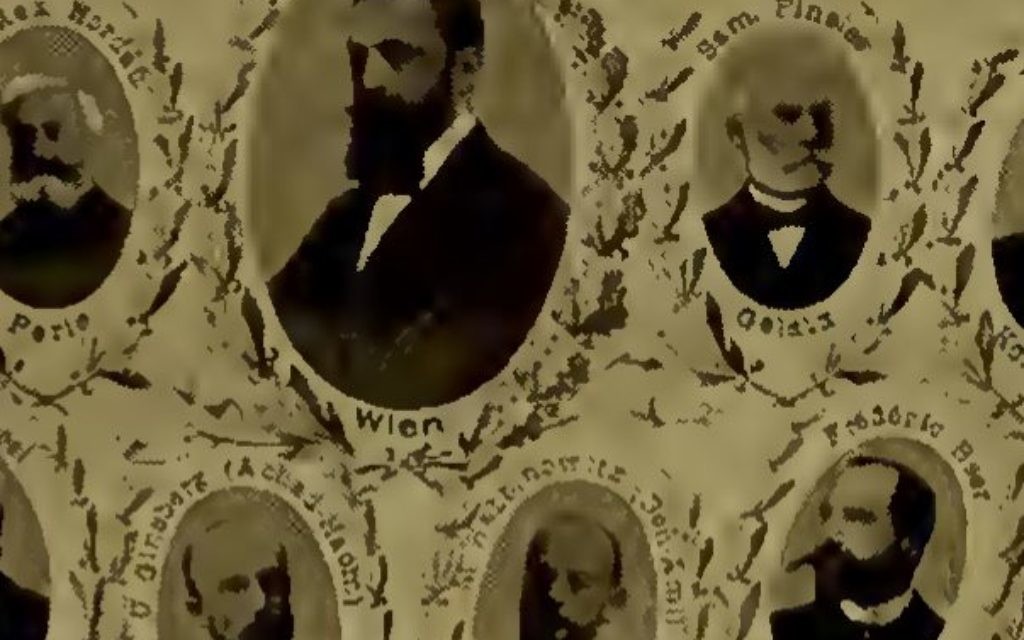Herzl, Ha’am and Uncivil Zionist Discourse
We've never had a consensus on Israel or the idea of a Jewish state, but that's OK.

Each day, it seems, new stories and discussions in traditional and social media concern the lack of civility in political discourse. This is also true in conversations, both within the Jewish community and among people of all faiths, regarding Israel.
Despite our tendency to dwell inside our personal echo chambers, there is value to be had in listening to and engaging with each other. Examining Jewish history shows that this type of engagement not only is critical to advancing many causes and issues, but also is not a new phenomenon.
One hundred fifty-eight years ago this week, on May 2, 1860, Theodor Herzl, the founder of the Zionist movement, was born in Pest, Hungary. While Herzl was not the first to call on Jews to create a state of their own, his organization, drive and vision gave the idea the impetus to become a movement.
Get The AJT Newsletter by email and never miss our top stories Free Sign Up
Paul Goodman, a prominent British Zionist leader, wrote in 1929, “Theodor Herzl and his diplomatic activities raised the resettlement of the Jews in Palestine from a romantic idea fostered by some well-meaning, if influential, persons into the realm of international interest and practical politics.”
Herzl laid a foundation for the remarkable achievement of a Jewish state in an extraordinarily short period. After the First Zionist Congress, which he convened in Basel, Switzerland, in the summer of 1897, Herzl prophetically wrote in his diary, “If I were to subsume the Basle Congress in one word — which I shall not do openly — it would be this: at Basle I founded the Jewish state. If I were to say this today, I would be met by universal laughter. In five years, perhaps, and certainly in fifty, everyone will see it.”
Herzl wrote these words on Sept. 3, 1897. On Nov. 29, 1947, 50 years and 87 days later, the U.N. General Assembly passed Resolution 181, the Partition Plan for Palestine, paving the way for the birth of Israel the next spring. Herzl, it seems, was also prophetic.
Despite his achievements, what is often lost in the mythology surrounding Herzl is that he faced bitter opposition from the outside and from within his movement. Among his most vocal critics was Asher Ginsberg, the Russian writer and thinker better known by his pen name, Ahad Ha’am.
In 1902, after the publication of Herzl’s utopian novel “Altneuland” (Old New Land), Ha’am wrote a vicious criticism claiming that Herzl’s vision for a Jewish state had nothing discernibly Jewish about it.
The public disagreements between Herzl and Ha’am, and certainly many others, are an important reminder that there has never been Jewish consensus when it comes to Zionism and Israel. Public discourse, while often vitriolic and personal, has been central to the development and growth of the Jewish state.
We must remember at this time of heightened discourse over issues like settlements, religious pluralism and the location of the U.S. Embassy that there is value in disagreements and conversation. Additionally, there is still importance in the mythology around Israel and Zionism, just as there should be an imperative for us to expand our knowledge of the real story.
Ha’am wrote after Herzl’s death in 1904, “The actual, living Herzl said and did much that was open to question. … But the ideal figure of Herzl, which is being created before our eyes in the popular mind — what a splendid vision it will be to whet its desire for a real national life! … Of course, imagination has not yet finished its work. The creation is not yet perfected. As time goes on, and the ideal picture of the national hero attains its perfect form, he will perhaps become for our day what the old national heroes were for our ancestors in days gone by: The people will make him the embodiment of its own national ideal, in all its radiance and purity, and will derive from him strength and courage to struggle onward indefatigably along the hard road of its history.”
Rich Walter is the associate director for Israel education at the Center for Israel Education (www.israeled.org).




comments